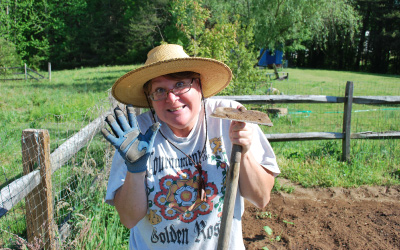 With passions in gardening, sustainable homesteading and competitive archery, Lorelei Elkins encourages others to get out, get their hands dirty and grow something.
With passions in gardening, sustainable homesteading and competitive archery, Lorelei Elkins encourages others to get out, get their hands dirty and grow something.
Elkins explained that while she didn’t grow up on a farm, she and her family always had chickens, ducks and a goat.
“We only had about an acre of land, but I had friends that had a farm and I’ve always had an interest of the back to earth lifestyle,” she explained.
Elkins noted that she currently has 26 chickens, with another 10 on the way, mostly raising the chickens for their eggs. She also has a pair of Emden geese, all on two acres of land.
“They are organic free range and I close them up in their house at night to roost,” she said about the chickens. “The geese are great watch animals. You can’t get too close to my house without them warning me.”
Elkins noted that her chickens, which are Black Copper Maran, Cuchoo Maran, and Araucana, lay really dark eggs. As for her geese, they lay greenish blue eggs.
“They taste the same as regular eggs. Most people think that the dark eggs taste different, but they don’t,” she said, noting that she gets about four chicken eggs to one goose egg. “We usually let the geese sit on their eggs and we get goslings in the spring and sell those.”
Of all the birds they have, Elkins said her favorite is a chicken named, Clucky.
“She never shuts up and is always underfoot asking for food. She is very broody (wants to sit on her eggs) and gives me a little attitude when she wants to sit on the nest. She has a little personality,” she said, noting that Clucky is a Buff Orpington, the only one of its kind at Archer’s Rest.
When giving advice on raising chickens, Elkins said they are easy to raise.
“I have 26 chickens, but you don’t need to start with that many. If you have two chickens, they provide a lot of fertilizer for the garden and a few eggs,” she said. “You have to make sure you have an area to protect them from predators like red tailed hawks and dogs. It’s a great way to connect with the earth a little bit.”
When it comes to making a connection with the earth, Elkins noted that in today’s society, there is often a big disconnect in that department.
“If you ask a kid where their food comes from, most of the time they won’t say the garden or farm, they will tell you it comes from the grocery store,” she said. “We as an ever increasing urban society are distanced from the process of growing our own food and animals. I think it’s a skill all kids should learn and if the economy gets bad again, it offers a means to supplementing what we buy at the grocery store. I suppose they call it food security. Secondly, I think it is important to maintain our rural atmosphere in Kernersville, and in the Triad region. Our agricultural land is quickly disappearing into commercial development and housing units. Family farms are quickly disappearing and with that, we lose a lifestyle of resilience.”
In her pursuit to connect with the earth, Elkins said that she does a little bit of everything.
“We do everything organically here,” she said, noting that along with the birds, they also have gardens and a beehive. “Same with the bees – we do everything naturally, and we have rain barrels.”
Although she has a full time job, along with a garden, canning, caring for bees, and raising chickens and geese, which she noted is a lot of work, she said she enjoys every minute of it.
“It’s good work. I don’t watch TV, other than Netflix, for about 13 years now and we don’t miss it,” she said. “We do other things and our time is usually spent outside doing something. It’s, I think, worth the reward.”
Along with raising geese, chickens and bees, Elkins is also passionate about gardening and sustainable homesteading as well as competitive archery. She noted that when doing archery, she uses a long bow and a re-curve (hand bow).
“I belong to a group that does archery reenactment. It is The Society for Creative Anachronism. We have archery practice at our house and it’s all traditional,” she said. “We have a variety of events and practice about once a month. You can find a local group at www.SCA.org, but we’re always happy to have more people at events.”
Elkins noted that she is an environmental educator, always promoting people to get outside.
“I’m an environmental educator and work for Forsyth County,” she shared, noting that while she is no longer active in it, she is also a Forsyth County Master Gardener. “I participated when my son was young and I fully support their program. It is through the cooperative extension. I try to support people getting their hands dirty at every opportunity.”
At her home, Elkins said they have an edible landscape, where they are able to grow enough food for themselves, as well as the animals that come through their property.
“I have a great neighbor that lets me use some of his property if I want to grow something bigger,” she shared. “I try to use as many native species as possible; it’s more food for the birds and wildlife habitat.”
On their property, Elkins said they have about three or four different varieties of blueberries.
“They seem to like the Triad soil. If anyone wants to start gardening, I recommend trying to plant a blueberry bush,” she said. “We also have an asparagus perennial bed. You plant the roots about two feet deep and they come up every year and supposedly they can last about 100 years. We also have blackberries, raspberries, four apple trees, two peach trees, and pear, plum, and cherry trees. We have grapevines too – once we figured out how to prune them the right way. We get about 100 pounds off of two vines.”
Elkins noted that they were able to make a couple gallons of wine this year, as well as jam. They have one vine with Concord grapes and one with Catawba.
“We also get enough berries and fruit (from our landscape) to do quite a bit of canning and pickling,” she said, noting that they do lacto fermentation style pickling. “That’s the traditional way. You use salt instead of vinegar.”
Elkins recommends for everyone to get back to tradition and planting something in their garden.
“I recommend that even if you have never done gardening before, to consider planting some edibles in a raised bed,” she said. “Nothing beats the taste of fresh tomatoes off the vine or strawberries picked fresh that morning, opposed to having them come from across the country from California. It cuts down on food miles and we live in an area that has a bountiful variety of fruits and vegetables. If you go to one of our local farmers markets you’ll see the diversity of products available. They are healthier and taste better.”
She added, “I just really want to encourage people to get their hands dirty, get outside and grow something you love. You won’t be sorry.”
Elkins noted that with the eggs they have left over, they do sell them for $3/dozen. If interested in eggs, visit “Archer’s Rest” on Facebook.
Elkins noted several classes available in February at the Forsyth County Cooperative Extension including Seed Starting on February 17, Forks on Friday: Plan and Plant Your Spring Vegetable Garden on February 19, Community Garden Mentor Training on February 20 and February 27, and First Aid for a Healthy Yard on February 20.
For more information about these classes, call 336-703-2850 or visit www.forsyth.cc/CES/.
Archer’s Rest
Previous post: Archer’s Rest
Next post: Joyful Notes









